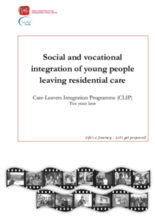Introduction
According to the 2011 UNICEF report, the situation of the children in Bulgaria is worrying. Even though decreasing, the number of children in the specialised institutions continues to be high (more than 5000 children) and the poverty is determined as the major factor.
It is also important to take into account the general decrease of the child population in Bulgaria, which indicates that the relative decrease of the number of children in specialised institutions is not at all that drastic and the number of Roma children –still high.
In the recent years significant changes are being made for modernising the facilities and the organisation of the institutions for children deprived of parental care. Alternatives to the specialised institutions have also been developed.
During the “transition period” there were difficulties in overcoming the “collective” approach to these children, each of them with their own personal story and specific needs. In order for them to grow as young people of full value, providing good facilities is necessary, but far from enough. To be able to make achievements and for their dreams to come true, and to even start dreaming, they (like any other child) need a supporting and positive environment, a support from society.
Only a decade ago, children and young people in institutions were cared for one way or another, but rarely acquired social, household or professional skills. After turning the age of 18 or after graduating from high school, the young people left the institution regardless of their preparedness to do so. Some return to their families. However, for most of them the “Home” is their only home, and the tutors - the only family they knew.
In 2002 the International Social Service started a programme for social and professional realisation of young people leaving HRBCDPC (Care Leavers Integration Programme, CLIP), to fill a gap in the social system existing for more than 10 years after the beginning of the transition period. The main objectives of the project are to create equal opportunities for children and young people raised in specialised institutions; to apply individual approach and to ensure psychosocial support; to create a social environment and support for their professional development.
The positive results of achieving these goals could be seen when the children and young people, included in the project, are able to give an answer to the question of what they intend to do after they finish their education. A particular success of the programme is when the young people have developed the competences and skills that can help them cope with life with their own resources. An undisputable success is when after a few years the young people have achieved sustainability in their social and professional relationships.

